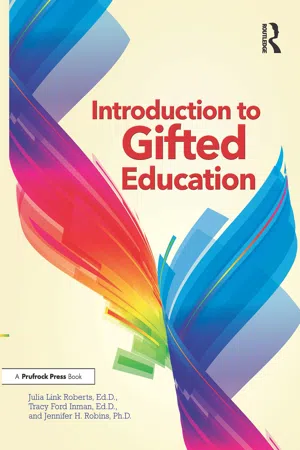
- 482 pages
- English
- ePUB (mobile friendly)
- Available on iOS & Android
Introduction to Gifted Education
About this book
Introduction to Gifted Education is the definitive textbook designed for courses that introduce teachers to gifted education, whether that is in graduate school or in certification or continuing development programs for teachers. The book is inclusive in nature, addressing varied approaches to each topic while relying on no single theory or construct. The book includes chapters that focus on critical topics such as gifted education standards, social-emotional needs, cognitive development, diverse learners, identification, programming options, creativity, professional development, and curriculum. The book provides a comprehensive look at each topic, including an overview of big ideas, its history, and a thorough discussion to help those new to the field gain a better understanding of gifted students and strategies to address their needs. A rich companion piece supports the text, providing practical strategies and activities for the instructor (designed for both online classes and face-to-face classes). Texas Association for the Gifted and Talented 2018 Legacy Book Award Winner—Scholar
Frequently asked questions
- Essential is ideal for learners and professionals who enjoy exploring a wide range of subjects. Access the Essential Library with 800,000+ trusted titles and best-sellers across business, personal growth, and the humanities. Includes unlimited reading time and Standard Read Aloud voice.
- Complete: Perfect for advanced learners and researchers needing full, unrestricted access. Unlock 1.4M+ books across hundreds of subjects, including academic and specialized titles. The Complete Plan also includes advanced features like Premium Read Aloud and Research Assistant.
Please note we cannot support devices running on iOS 13 and Android 7 or earlier. Learn more about using the app.
Information
SECTION I
Getting Started

- » All children are gifted. Although all children are special, gifted children are exceptional learners, often learning at a pace and level of complexity that exceeds other children of the same age.
- » You must be gifted in everything if you are truly gifted. Children vary greatly in how their giftedness is demonstrated. Some are gifted in one area and at grade level (or below) in other areas, while some may show their exceptionalities in multiple areas.
CHAPTER 1
Conceptual Frameworks in Gifted Education as the Foundation for Services
- What is a conceptual framework, and why does it matter in gifted education?
- In what ways are conceptual, operational, and policy definitions of giftedness and talent alike and different?
- What are the relationships among the components of a conceptual framework (beliefs, philosophies, definitions, student needs, community and cultural contexts, identification and talent spotting, services, and outcomes)?
- How do we encourage multiple perspectives in conceptual frameworks, but a unified voice for advocacy?
Table of contents
- Cover
- Half Title
- Title Page
- Copyright Page
- Contents
- Introduction
- SECTION I Getting Started
- SECTION II The Gifted Learner
- SECTION III The Basics for Advanced Learning
- SECTION IV Programming for Advanced Learning and Talent Development
- SECTION V Diversity of Learners
- SECTION VI Improving Services for Gifted Learners: Moving Forward
- About the Editors
- About the Authors